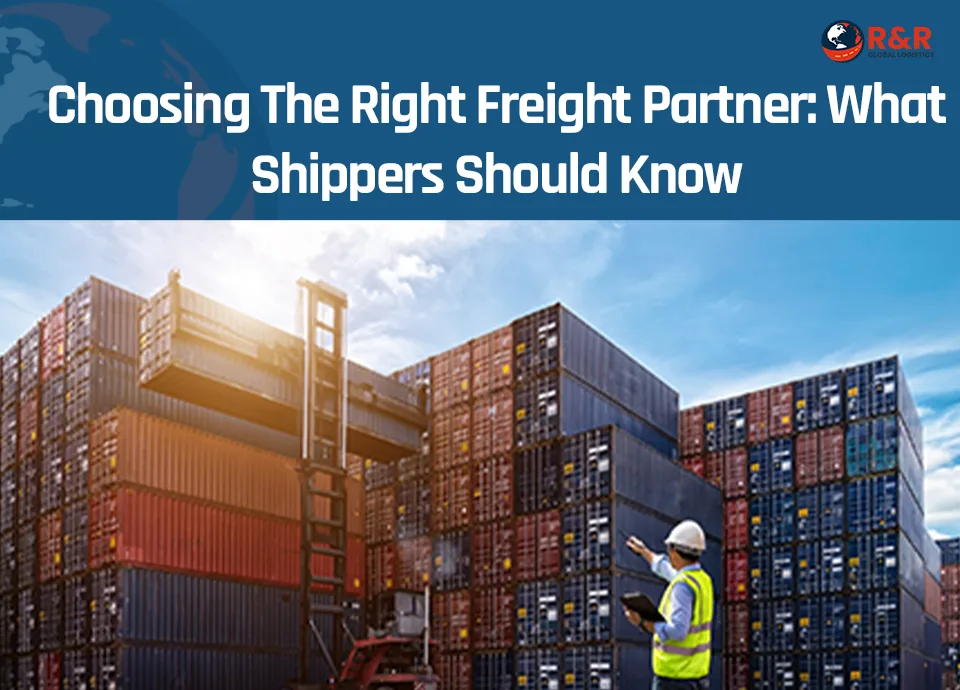Introduction
In today’s fast-paced logistics environment, choosing the right freight partner is more than just a cost decision — it’s a strategic move that directly impacts your supply chain efficiency, customer satisfaction, and business growth. Whether you’re managing local deliveries or global shipping, the wrong partner can lead to missed deadlines, damaged goods, hidden fees, and a lack of visibility — all of which put your reputation at risk.
So how do you choose the right freight partner? In this guide, we’ll break down the critical criteria every shipper should consider before signing that contract.
1. Understand Your Shipping Needs First
Before evaluating potential freight partners, clearly define your shipping requirements. This includes:
- Types of freight: Full Truckload (FTL), Less Than Truckload (LTL), Intermodal, Drayage, Air, or Ocean.
- Geographic coverage: Do you need domestic, cross-border, or international capabilities?
- Frequency and volume: Are you shipping daily, weekly, or seasonally?
- Special handling needs: Temperature control, overweight permits, high-value goods?
A great freight partner will align with your current needs — and have the flexibility to scale as your business grows.
2. Evaluate Industry Experience & Expertise
Choose a logistics provider that specializes in your industry. Freight forwarding for pharmaceuticals is vastly different from shipping industrial machinery or perishable goods.
An experienced partner should:
- Be familiar with your cargo’s regulatory requirements.
- Know how to navigate customs clearance efficiently.
- Understand the best practices for packaging, compliance, and route planning in your industry.
- Provide case studies or references from similar businesses.
Working with a provider that understands the nuances of your sector will reduce friction, improve efficiency, and protect your freight.
3. Technology: Visibility, Tracking & Integration
Today’s shippers expect real-time visibility — and your freight partner should provide it.
Look for logistics partners who offer:
- Live shipment tracking
- Automated status updates
- API or TMS integration
- Digital document management
Tech-enabled partners not only give you peace of mind, but also reduce manual communication and improve planning accuracy.
4. Service Reliability & On-Time Performance
A low rate means little if the shipment arrives late or damaged. When evaluating partners, ask about:
- On-time delivery rates
- Damage claims history
- Communication protocols for delays or exceptions
- Their contingency plans in case of disruptions (weather, port congestion, etc.)
The best freight partners are those you can rely on without micromanaging.
5. Transparency in Pricing & Billing
Hidden charges, fuel surcharges, accessorial fees — freight billing can be confusing. Choose a partner that offers transparent pricing and clearly outlines:
- Accessorial costs
- Detention or demurrage charges
- Rate validity periods
- Billing cycles and payment terms
Bonus: A great partner will help you optimize costs, not just invoice you.
6. Network Strength & Carrier Vetting
Your freight partner’s carrier network is an extension of your supply chain. Ask:
- How large and vetted is their carrier pool?
- Do they offer both asset-based and non-asset-based solutions?
- How do they ensure carrier compliance (insurance, safety, FMCSA audits)?
- Do they have access to equipment like chassis, gensets, refrigerated trailers, etc.?
A strong network ensures capacity, especially during peak season or in tight markets.
7. Customer Support & Responsiveness
Even with technology in place, logistics still involves people. Consider the partner’s:
- Responsiveness to inquiries
- Availability during off-hours or emergencies
- Dedicated account managers or dispatch teams
- Willingness to provide proactive updates
Support can make the difference between a small issue and a full-blown disruption.
8. Value-Added Services
Modern freight partners often offer more than just transportation. Look for:
- Warehousing and distribution
- Freight auditing and optimization
- Customs brokerage
- Transloading and cross-docking
- Consulting or supply chain analysis
The more your partner can support your end-to-end logistics, the more seamless your operation will be.
9. Compliance, Certifications & Insurance
Make sure your partner is fully compliant with all relevant local and international regulations. They should provide:
- DOT compliance and MC authority
- Cargo insurance and liability coverage
- E&O insurance (Errors & Omissions)
- Certifications like C-TPAT, ISO, or other industry-relevant credentials
This ensures risk is minimized and your shipments are legally protected.
10. Reputation & References
Lastly, always check reviews, testimonials, and case studies. A reliable partner will gladly share their successes and put you in touch with satisfied clients.
Final Thoughts: The Right Freight Partner is a Strategic Asset
Choosing the right freight partner isn’t just about moving goods — it’s about building a strategic relationship with someone who understands your business, supports your growth, and protects your reputation.
At R&R Global Logistics, we combine operational expertise, cutting-edge technology, and a client-first mindset to deliver world-class freight solutions across North America. Whether you’re shipping by truck, rail, air, or ocean — we’re ready to be your trusted logistics partner.

